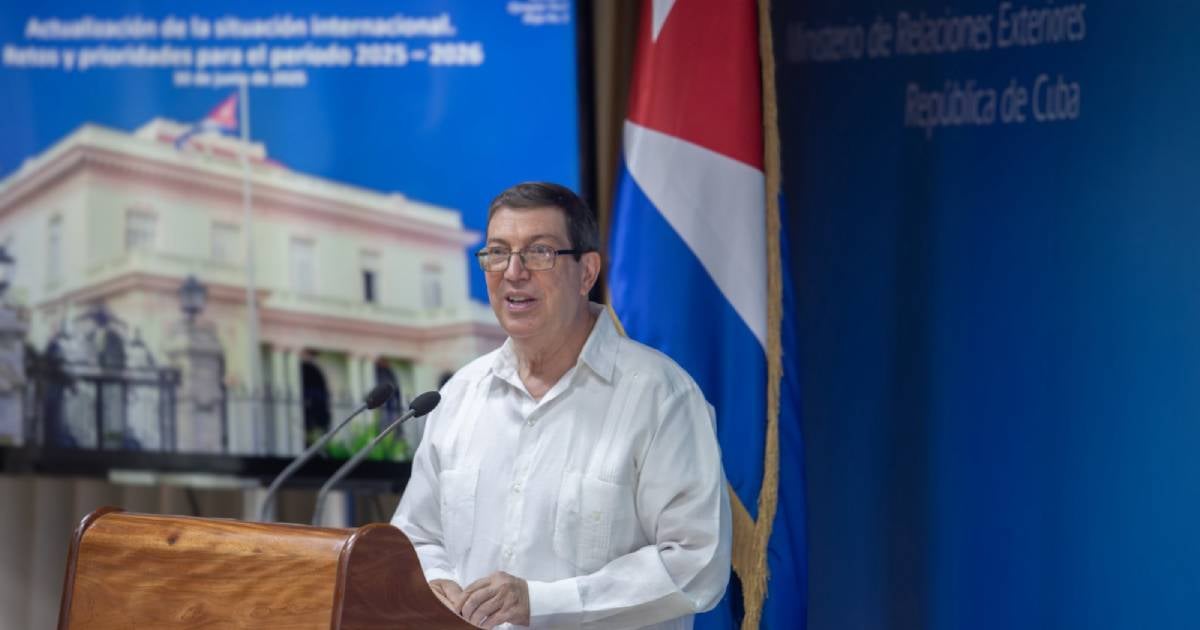Despite the Cuban regime's continued imprisonment of hundreds of political prisoners, suppression of dissent, and restriction of basic freedoms on the island, Foreign Minister Bruno Rodríguez Parrilla deemed the new U.S. policy towards Cuba, announced by President Donald Trump, as "criminal behavior" and a human rights violation. On Monday, Rodríguez expressed his disapproval through his official account on the social media platform X, formerly known as Twitter, in response to the Presidential Memorandum of National Security (NSPM) released by the White House. This memorandum strengthens economic pressure on the Cuban government and reestablishes the restrictive policy adopted by Trump during his first term.
"The Presidential Memorandum against Cuba released today by the U.S. government intensifies aggression and the economic blockade that punishes the entire Cuban population and is the main obstacle to our development. It is a criminal act and a violation of the human rights of an entire nation," wrote the Cuban diplomat.
Details of Trump's New Memorandum
Signed on June 30, 2025, the document aims to reverse the relaxations introduced during the Biden administration and restore a tougher stance against the Cuban regime. Key measures in the NSPM include:
- A total ban on financial transactions, direct or indirect, with entities controlled by the Cuban military and security apparatus, including the conglomerate GAESA.
- Strengthening the economic embargo and explicit opposition to any attempts to lift it in international forums such as the United Nations.
- Reinstating travel controls from the U.S. to Cuba, including periodic audits and mandatory records of tourism-related transactions.
- Maintaining the "Wet Foot, Dry Foot" policy, eliminated by Obama, to discourage irregular migration.
- Commitment to promote internet access, press freedom, and support for independent civil society on the island.
- Requirement for a review of human rights violations in Cuba, with reports on political prisoners, inhumane treatment, and fugitives from U.S. justice allegedly harbored on the island.
A New Chapter of Tension
The hardened policy has been presented by Trump as a method of supporting the Cuban people against the "communist regime," which he accuses of repressing dissent, violating fundamental liberties, and engaging in practices that violate human rights. However, from Havana's perspective, these actions are seen as aggression that suffocates the population and hinders the country's economic development.
Rodríguez's statements are part of a long-standing conflict between Washington and Havana, which has experienced numerous shifts depending on the political orientation of each U.S. administration. As the island faces one of its most severe crises in decades, characterized by blackouts, food shortages, inflation, and an unprecedented migratory exodus, the Trump administration's announcement adds a new layer of uncertainty to the future of bilateral relations and the internal situation of the country.
Key Questions on the U.S.-Cuba Policy Shift
What are the primary changes in Trump's new policy towards Cuba?
The new policy reinstates a stricter approach by banning financial transactions with Cuban military-controlled entities, reinforcing the economic embargo, and reinstating travel controls. It also seeks to reintroduce the "Wet Foot, Dry Foot" policy and emphasizes promoting internet access and press freedom on the island.
How has the Cuban government reacted to the new U.S. policy?
The Cuban government, represented by Foreign Minister Bruno Rodríguez, has condemned the policy as "criminal behavior" and a violation of human rights, viewing it as an aggressive act that stifles the Cuban population and impedes economic development.
What impact could the policy have on U.S.-Cuba relations?
The policy could further strain relations between the two countries, adding uncertainty to their future interactions, especially as Cuba deals with severe economic and social crises.
